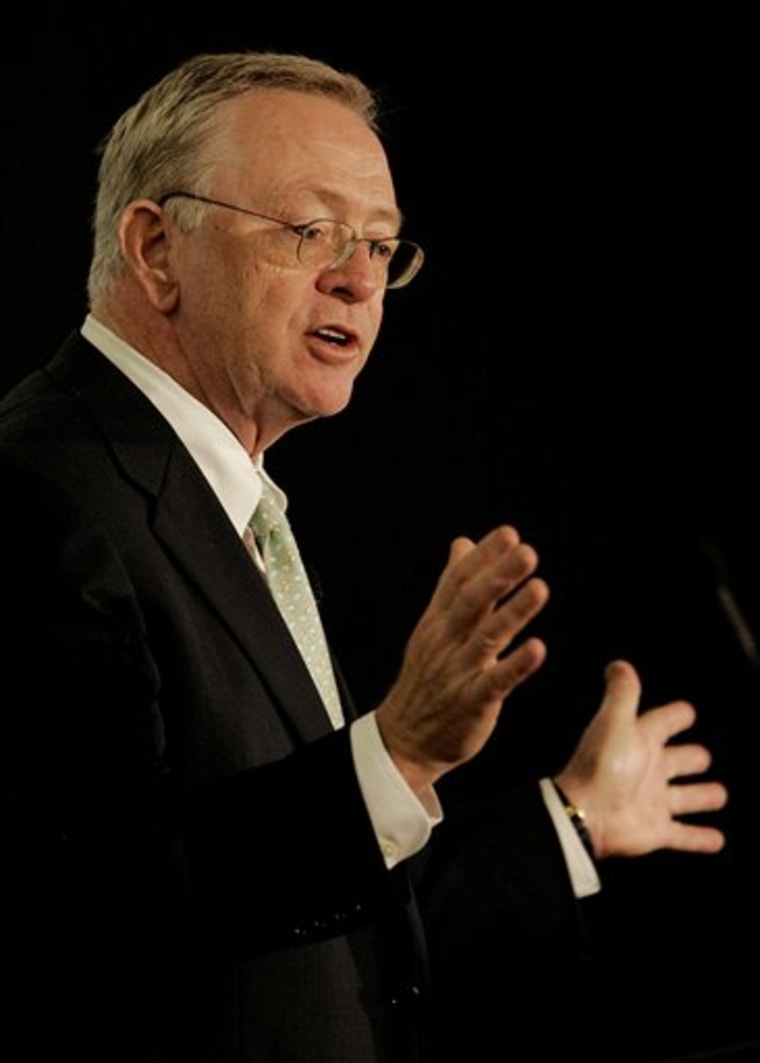Freddie Mac beat Wall Street’s expectations in the first quarter, but the mortgage finance company didn’t vanquish concerns about its ability to weather the housing bust.
Changes in accounting practices helped McLean, Va.-based Freddie Mac achieve better-than-expected results Wednesday. For example, Freddie adjusted how it accounts for derivatives, financial instruments used to hedge against swings in interest rates.
Under the new accounting practices, the company said it lost more than $1.3 billion on those derivatives in the first quarter, compared with a loss of nearly $2.3 billion in the fourth quarter of 2007.
“If you change the accounting rules, things can look better,” said R. Christopher Whalen, managing director of consulting firm Institutional Risk Analytics.
Others saw the change as a needed improvement that better reflects performance. In a research note, Citigroup analyst Bradley Ball cited “improved accounting methodologies” as a reason for Freddie’s positive results.
Freddie reported a first-quarter loss of $151 million, or 66 cents a share, beating the expectations of analysts polled by Thomson Financial, who expected a loss of 92 cents per share.
Skeptics have long warned that Freddie and its larger government-sponsored sibling Fannie Mae won’t be able to withstand severe mortgage market losses without a federal bailout.
However, Freddie CEO Richard Syron said in a conference call with analysts that losses from the mortgage mess will be manageable “under any reasonable scenario.”
Moody’s Investors Service downgraded the company’s financial strength rating, projecting Freddie Mac will be hit with up to $7.5 billion in total losses from soured mortgages over the next two years.
In another potentially troubling sign, a measurement of the company’s total assets fell to negative $5.2 billion at the end of the first quarter, a huge swing from positive $12.6 billion at the end of last year.
Company spokesman Michael Cosgrove downplayed the drop, as it reflects a frozen market for mortgage investments. “We don’t believe that it has a significant impact,” he said.
Company executives maintained their projection that average U.S. home prices will drop by 15 percent from their peak, but didn’t rule out greater declines. “It’s clear we have not yet hit bottom in the housing market,” Syron said.
Freddie Mac said it plans to raise $5.5 billion in new capital, following a similar move last week by Fannie Mae. As a result of the planned stock sale, Freddie Mac’s federal regulator said it would reduce the capital cushion the company must maintain.
Investors were encouraged that relaxed requirements by the company’s federal regulator will allow Freddie to play a larger role in the battered mortgage market.
The Office of Federal Housing Enterprise Oversight made a similar announcement last week for Fannie Mae, which is raising $6.5 billion to fortify its balance sheet. Freddie Mac’s chief financial officer, Buddy Piszel, said the regulator’s move would allow the company to buy mortgage securities at attractive prices.
Freddie’s plan to raise capital — evenly split between common and preferred stock — likely is smaller than many investors had expected, thus resulting in less dilution for existing shareholders, said analyst Jim Vogel of FTN Financial in Memphis, Tenn.
“There were a lot of bears on Freddie who felt they would have to raise still more,” common stock, Vogel said.
Freddie Mac’s shares gained $2.29, or 9.2 percent, to $27.25.
Freddie will be required to keep 15 percent more capital than required by law, down from the current 20 percent mandate. Another five-point cut is expected to come in September, as long as the company stays in good standing with the regulator.
The quarterly loss at Freddie was larger than a loss of $133 million, or 35 cents a share, in the January-March period last year.
Freddie Mac said it set aside $1.2 billion for losses in the first quarter as a result of rising mortgage delinquency rates, falling home prices and sales. Revenue in the period, however, rose to $1.53 billion from $694 million a year earlier.
Piszel, however, cautioned that the company’s losses from the mortgage mess are likely to last through 2009.
Freddie Mac is expecting total losses from bad mortgages and foreclosed properties to hit $3.1 billion this year, or 0.16 percent of the total value of mortgages the company guarantees. That’s up from an earlier projection of 0.12 percent.
“We would have to acknowledge that credit is worse,” Piszel said.
New data on foreclosures underscored that point. Foreclosure listing service RealtyTrac Inc. said Wednesday that more than 243,000 U.S. homes received at least one foreclosure-related filing in April, up 65 percent from the same month last year.
In response to growing economic distress, lawmakers are trying to come to terms with the White House on a broad package of housing legislation that would help an estimated 500,000 homeowners refinance into new loans, while tightening oversight over Fannie and Freddie.
